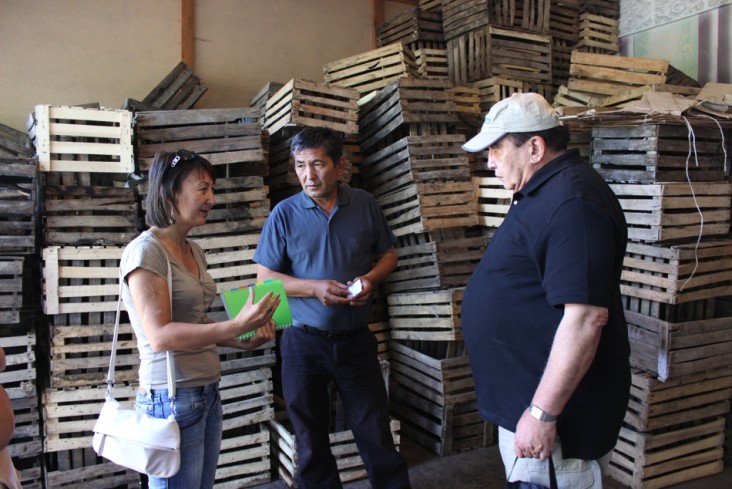
July 2015—Nuridin Erjigitov, an apple farmer in the Kyrgyz Republic, faces a problem every autumn: He has more apples than he can sell at a good price. Thousands of other small-scale farmers in Nookat rayon face the same challenge.
The farmers can choose to sell their apples when market prices are low due to high supply, or store the apples and sell later when supply is low and prices are high. Many small-scale farmers, however, sell when prices are low because they lack access to suitable storage facilities and knowledge of proper postharvest techniques.
Nookat, located in the country’s southern Osh province, is a major apple producer for the Kyrgyz market.
USAID has been supporting small-scale farmers such as Erjigitov in the Kyrgyz Republic for over two decades. Through the USAID-funded Local Development Program, which ran from 2010 to 2013, farmers in Nookat now have access to over 1,900 metric tons of cold storage facilities.
Cold storage significantly increases the storage life of products grown in the Nookat region such as apples, apricot, peaches, cherries, potatoes and carrots, and allows farmers to increase their incomes by selling when prices are higher. Previously, Erjigitov sold his surplus apples in January for 60 cents per kilogram (35 Kyrgyz soms), a low price due to oversupply. He now sells his stored apples in March, in the off-season, for $1.04 (60 Kyrgyz soms).
“Our farm’s profit is increasing because we can store our products longer without sacrificing quality,” says Erjigitov. “We buy products from many other farms, too, so the community also benefits. Consumers can also enjoy seasonal products at a later time. It is a win-win for everyone.”
To maximize the proper use of cold storage facilities, the Training and Extension System Center (TES), a local NGO, requested USAID’s support in training farmers on postharvest best practices. The USAID-funded Farmer-to-Farmer (F2F) Program brought Mohamed Adbel-Rahman, a postharvest technology expert from the United States, to work with TES and Nookat farmers.
Having completed five F2F assignments in the Kyrgyz Republic since 2005, Adbel-Rahman arrived in Nookat in June 2014, where he visited storage facilities belonging to cooperatives and farmers. He identified issues such as poor temperature control, inability to manage humidity, bad quality of wooden storage crates, and poor roads that contributed to the damage of crops during storage and transportation.
Adbel-Rahman gave tailored recommendations regarding these and other issues and led training sessions for farmers and local trainers to develop their skills in postharvest storage and handling. At the request of the farmers and TES, he returned in September 2014 at the beginning of apple harvest season to provide practical guidance on when and how to pick apples for optimal storage.
“Since my first visit in 2005, cold storage capacity has increased by 500 percent in the Nookat region,” said Adbel-Rahman. “Farmers are now investing in cold storage themselves without USAID’s support. This means that the intervention is sustainable and farmers now understand the full benefits and necessity of proper postharvest techniques.”
Under the F2F Program, which runs from 2013 to 2018, volunteer experts from the United States work directly with local organizations and farmers to increase their knowledge and capacity.
LINKS







Comment
Make a general inquiry or suggest an improvement.